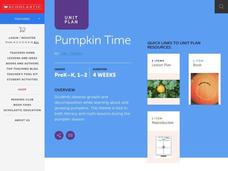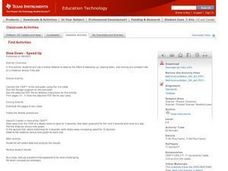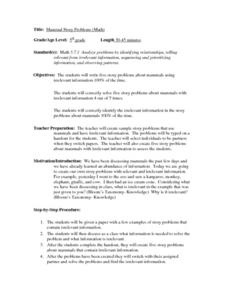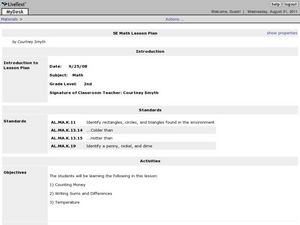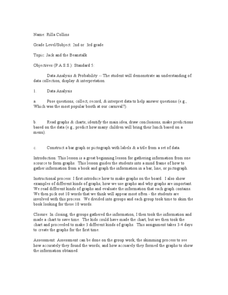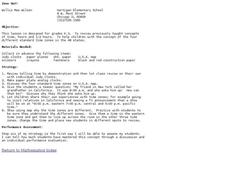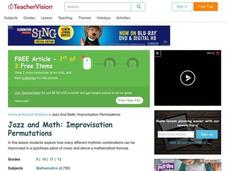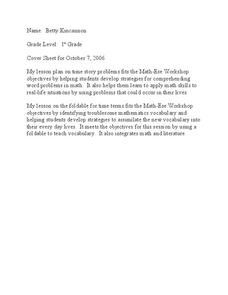Curated OER
Investigation - Snack TIme
Students explore solving addition and subtraction problems. They solve real life problems. Students participate in a simulation activity to find the missing addend. They demonstrate adding and subtracting whole numbers.
Curated OER
Pumpkin Time
In these two lessons, science learners participate in various activities involving pumpkins. They investigate and research the life cycle of a pumpkin. They observe pumpkin growth and decomposition. Finally, they estimate and measure...
Curated OER
One Step at a Time
Students investigate the customs and habits of other cultures by reading letters from a Peace Corps Volunteer. In this global customs lesson, students discuss how analyzing a culture is similar to analyzing art, no two people see...
Curated OER
Introduction to Hours & Minutes
First graders identify, interpret, and gain proficiency in using a clock to tell time to the hour and determine how many minutes are in an hour. They identify and list what they do as they travel through their dayand how much time you...
Curated OER
Real-World Reasonableness
Fifth graders apply math to real-world situations. In this mathematics lesson, 5th graders are read the book, "Math Curse," which discusses ways in which math is used each day. Students then write a sequel to the book in groups,...
Curated OER
Slow Down - Speed Up
Pupils explore the concept of distance and time as they use a CBR to mimic distance v. time graphs. Learners walk towards and away from the monitor to create various distance v. time graphs, then discuss what motion creates certain graphs.
Curated OER
Making Cookies- How many per hour?
Fifth graders measure how long it takes to make cookies. In this measuring time lesson, 5th graders explore how to manage time. Students decide when to start making breakfast on time, how to calculate playing time into their lunch time,...
Alabama Learning Exchange
Mr. Crocodile's Busy Day
Demonstrate how to read analog and digital clocks to the hour in this time measurement lesson. Read the book What Time is it Mr. Crocodile? and use Mr. Crocodile's schedule to practice telling time. They work in cooperative groups to...
Curated OER
Mammal Story Problems (Math)
Fifth graders, after discussing the teacher's handout examples, practice writing five story problems about mammals using relevant/irrelevant information. As a class, they solve the story problems while identifying the key concepts that...
Curated OER
Exquisite Excursions
Students locate 6 cities, one on each of the 6 major continents. They find distance for each leg of their journey, convert to percents, use a time zone map, and convert to foreign currencies.
Curated OER
Counting Money Activity
Second graders explore commerce by practicing monetary transactions. In this consumer math lesson, 2nd graders practice using math functions to add and subtract different amounts of money. Students identify the different monetary units...
Curated OER
Activity Plan 2-3: Outdoor Picture Math
Young scholars match images of objects to their real counterpart. In this play-based matching lesson, children explore the playground and match real play equipment with what is seen in pictures. Lesson includes a language and literacy...
Curated OER
Jack and the Beanstalk Math
Students listen to Jack and the Beanstalk and determine what they think are the most common words. In this Jack and the Beanstalk lesson, students reread the story, count the words they chosen and graph those words. Students graph...
Curated OER
Zone Out!
Students review telling time to the hour and half hour on an analog clock. In this time instructional activity, the students learn how to determine the time in each of the 4 standard time zones.
Curated OER
Time Changes Everything
Students analyze census data from 1915, 1967 and 2006. They read an article about how the world's population is growing at an alarming rate. They use primary source documents to create a timeline on the information they gathered. They...
Curated OER
Uniform-Motion Problems: Just Playing with Cars
Students explore the concept of the formula for distance. In this formula for distance lesson, students time battery operated cars with constant velocity over 15 meters. Students use the distance = rate x time formula to determine the...
Curated OER
What's Your Speed?
Learners explore the concept of distance v. time. They use a CBR to collect data on their distance over time, then plot their data using a scatter plot and find an equation to model their data. Pupils discuss what if scenarios which...
Curated OER
Jazz and Math: Improvisation Permutations
Students observe that there are myriad combinations of rhythms to choose from when improvising jazz and blues music, and recognize that while the variations seem infinite, they are in fact finite. They notate a 12 bar blues progression...
Curated OER
Function Problems
In this function worksheet, students use given functions to determine the rate at which people enter and exit an amusement park. They compute the number of dollars collected at a specified time and predict when the number of people in...
Curated OER
How Does Your Garden Grow?
Students construct and maintain a school garden. In this gardening lesson, students plan the construction of the garden by writing letters to local businesses asking for supplies and materials; students build the garden using their math...
Curated OER
Codebreaker Math
Learners solve addition and subtraction problems and decipher and write messages using a code. They read and discuss an informational fact sheet about the Navajo code talkers from World War II, and decode and re-code messages using math...
Curated OER
Tell Time With Your Feet
Students discover what the latitude and longitude of their location is. They start walking and measure their shadow. They fill in a chart to discover the approximate time.
Curated OER
Time Story Problems
First graders solve story problems using an analog clock. In this time story problems lesson, 1st graders complete word problems on elapsed time and discuss their solutions.
Curated OER
Number: Time
Young scholars calculate time in decimals and fractions. In this time lesson, students divide hours into equal sections. They discuss how fractions and decimals correspond to hours and minutes.



